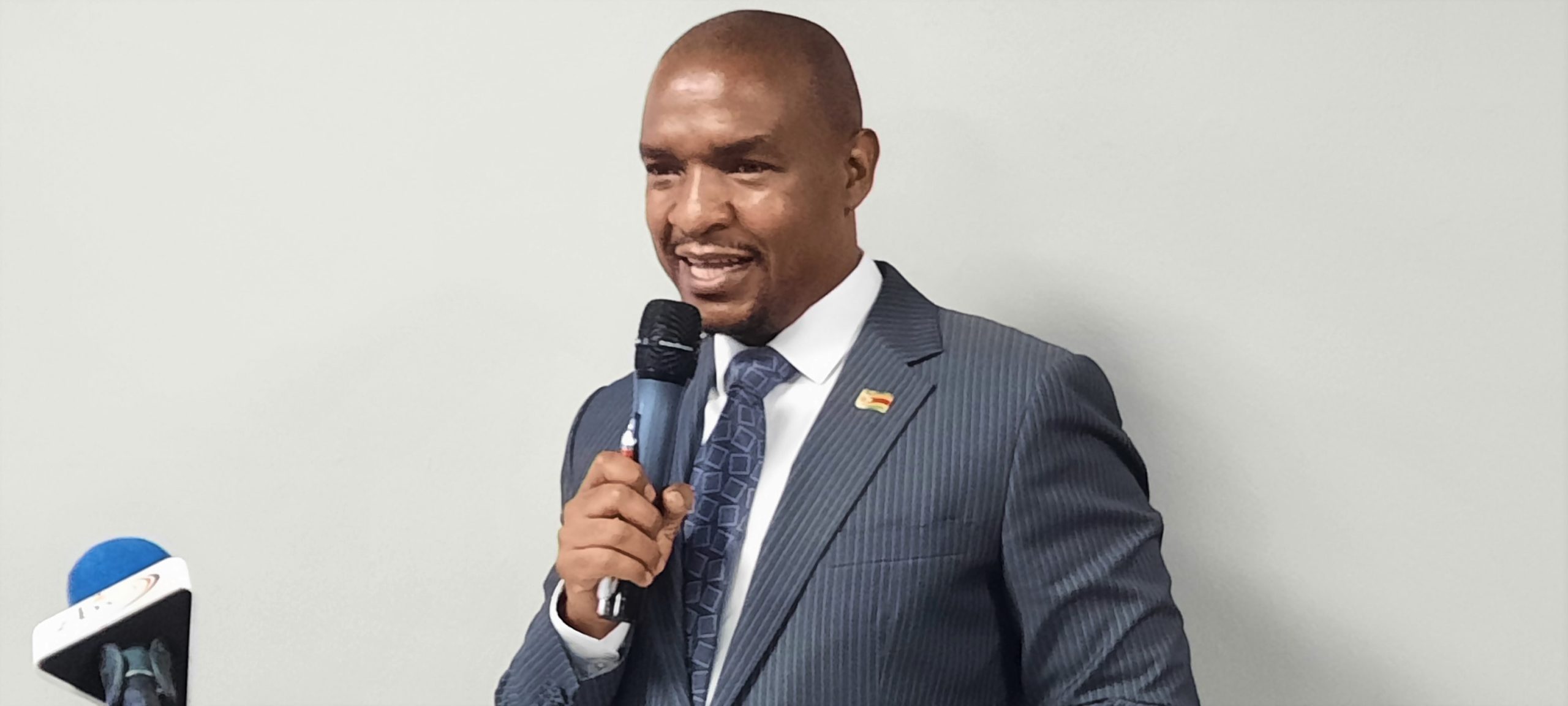
Government open to BOT’s on Feruka Bypass Road, Grand Reef aerodrome projects: Minister Mhona
October 27, 2021
ZNCC awards return after 2020 Covid-19 interruption
November 4, 2021Transport Minister Mhona speaks on poor workmanship on roads construction

L-R:ZINARA board chairperson Lizwe Bunu, deputy Transport and Infrastructural Development Minister Mike Madiro and Transport and Infrastructural Development Minister Felix Mhona during the Transport Ministry 2022 strategic planning workshop official opening held last week Wednesday in Mutare.
… ‘Contractors will be forced to redo the job if substandard work was done’
Ngoni Dapira
Public transparency on all Government transactions and tender systems will help reduce corruption tendencies in government and quasi government institutions, a senior government official has said.
Delivering his official opening remarks at a three-day strategic planning workshop for his Ministry held in Mutare last week Wednesday, the Transport and Infrastructural Development Minister Felix Mhona called on all departments to have effective plans to mitigate corruption. He further challenged his director’s and departmental heads to consider the needs of stakeholders and citizens when executing their mandate.
The Transport Minister admitted that bureaucratic tendencies in government were a drag and huge problem in the First Republic, but said visible progress to change this is notable in the Second Republic, adding that more measures are being inculcated to mitigate corruption.

Minister Felix Mhona.
“Bureaucratic tendencies were a drag in the First Republic, this is why we were not having projects the way we are seeing in the Second Republic, where this could be through procurement processes as something that will be inertia from the officials and that scared away investors. Now, what we are doing is to promote transparency of transactions, for example on all road rehabilitation tenders we want the citizens in the public domain to know, in terms of who was awarded tenders. If it’s a PPP (Public and private partnership), contract disclosure becomes important to reduce corruption,” said Minister Mhona.
Adding, “It’s true corruption is cancerous. There is no room for corruption. This is why we are looking at digitalization as a way to counter corruption through less human interface, like what we are doing with the electronic drivers’ license system that we are implementing. In the Second Republic we are moving with speed to mitigate corruption but it calls for a holistic approach which involves all stakeholders to whistle blow and not condone it.”
Minister Mhona said the Second Republic led by President Emmerson Mnangagwa has made infrastructure development a top priority in achieving economic prosperity as outlined in the National Development Strategy (NDS1 2021-2025), citing that already they have a lot of milestones achieved since President Mnangagwa declared a State of Disaster of the country’s roads in February.
“We have been moving with speed but the pace is constrained given that we are mobilisng resources domestically. When it comes to the issues of roads, we were seized with issues of pothole patching, vegetable clearances and those were emergency works that we were doing, but we also have issues to do with reconstruction and resealing. For instance the Harare –Beitbridge is reconstruction from the surface and in terms of resealing projects, this is being done where we have problem areas. In each category we have a compendium which shows kilometres done, cost and contractor, which we will broadcast in the print media and electronic media in terms of transparency and accountability of what we have covered.”
However, the remarks by the Transport Minister come at a time when Mutare residents are up in arms about the poor workmanship on several newly resurfaced roads, particularly the Aerodrome Road to Chikanga high density suburb that is deteriorating fast barely four months after resurfacing. Countrywide this month, videos have been circulating on social media, showing recently resurfaced tarmac roads that are peeling off in various parts of the country within a few months after being completed,
Quizzed on what is being done to rectify this, Minister Mhona said a monitoring and evaluation team from the Department of Roads will follow up on all road projects and contractors will be forced to redo the job if substandard work was done.
“We have given works to almost 80 different contractors to empower locals, but some are under-bidding and end of day they do not perform well in terms of contractual requirements. However, in terms of monitoring and evaluation, it will be ongoing and we need to make sure that when we tap into the national purse we also need to make sure Monitoring and Evaluation is done for accountability. We have a team in the Department of Roads that is following up on projects in terms of quality. Where we think the project is of shoddy state we will request the contractor to redo,” said the Transport Minister in a side interview last Wednesday.
In 2018 a lot of high profile businesspeople and politicians were arrested on corruption charges which led nowhere, as they were just set free after being briefly being detained in custody for questioning. It became what is now known as the “catch and release” strategy, that critics said was used for political expediency by the ruling Zanu-PF party.

UMRRT director retired Bishop Sebastian Bakare (left) and deputy director Edson Dube.
He said the importance of the 2022 strategic plan was that it would be the main plan of action in 2022, after evaluating themselves in 2021, in terms of what was achieved, the challenges and how to align themselves to the NDS1 blueprint. “We are a very big Ministry that oversees roads, aviation, inland waters and rail, so we need to harmonize our strategies as a Ministry,” he said..
According to the Zimbabwe National Chamber of Commerce (ZNCC) almost 20 percent of the National Budget is lost through corruption. The Public Procurement and Disposal of Public Assets Act, defines public procurement as the acquisition of any goods, construction works or services. Public sector procurement is one of the most significant economic activities by the Government, but it has been prone to a lot of abuse.

Phibeon Ngorima
Commercial Federation of Manicaland Trust (CFMT) managing trustee Phibeon Ngorima said tenderprenuership has become the order of the day in Zimbabwe and is now affecting service delivery and the quality of work done.
“Public procurement processes have remained at the centre of political debate and are characterised by complex dynamics of political or state capture, which has made tenderprenuership the order of the day in Zimbabwe. The failure to arrest political bigwig culprits of tenderprenuership has encouraged rampant corrupt activities in most public entities, but this has to stop because it is leading to underdevelopment. As a civic society, business lobby group we will speak out-and-out against corruption tendencies and tenderprenuership at the expense of quality service delivery,” said the managing trustee of CFMT, a recently launched non-profit making civic society lobby group that represents the interests of commercial property owners and stakeholders in Manicaland.
In January, Transparency International released the 2020 Corruption Perceptions Index (CPI) in the wake of how corruption was contained during the Covid-19 global pandemic in various countries. An overview of the 2020 CPI Report revealed that endemic corruption is weakening governments’ response to the pandemic, further threatening people’s health and livelihoods.
Zimbabwe maintained its 2019 score of 24 out of 100 with a global ranking of 157 out of 180 countries. This score is below the continent’s average of 32. The index ranks 180 countries and territories by their perceived levels of public sector corruption, according to experts and business people. It uses a scale of zero to 100, where zero is highly corrupt and 100 is very clean.


